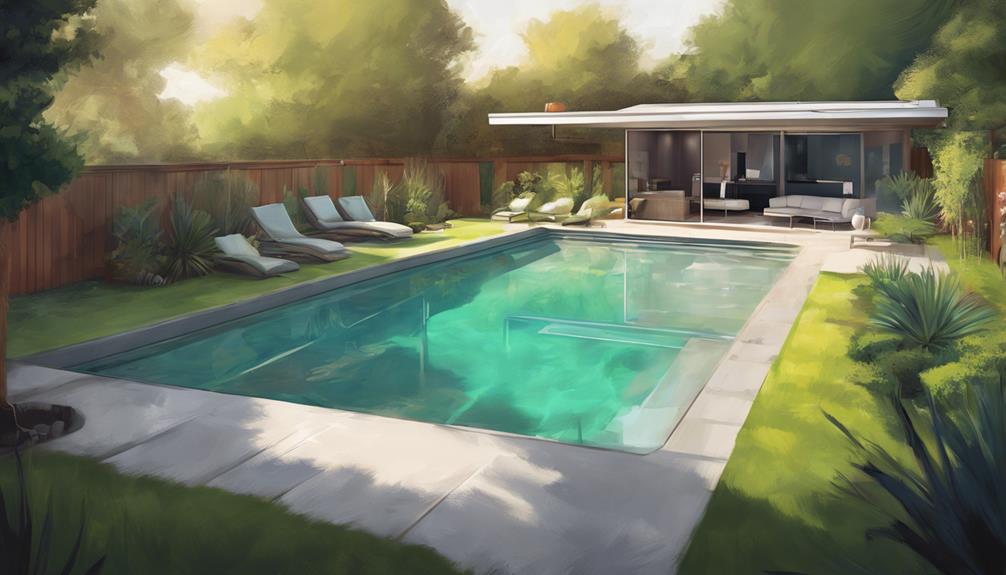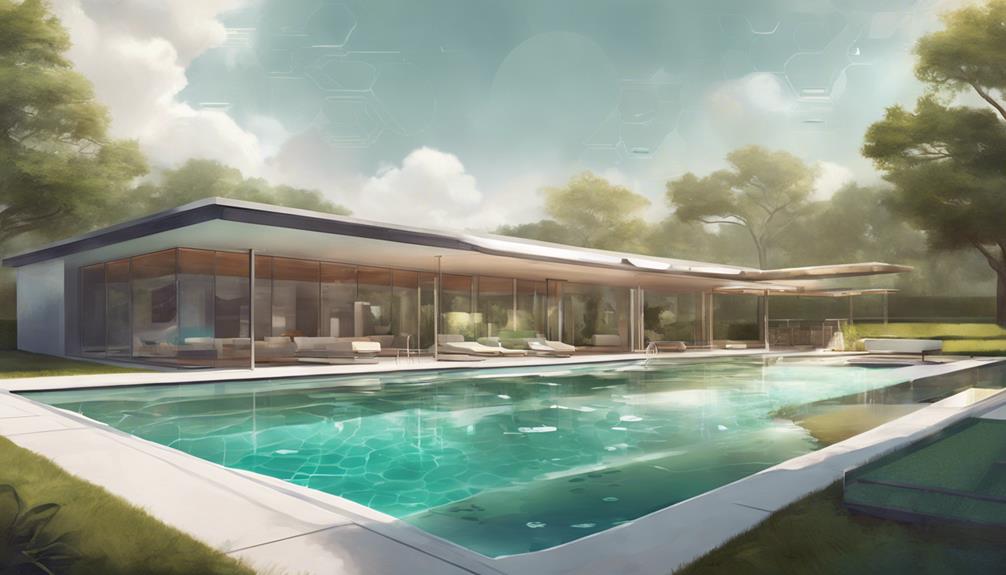Innovations such as salt-based sanitization systems are revolutionizing the pool industry by converting salt into chlorine, which in turn reduces odors and skin irritations. Energy-efficient equipment, like high-efficiency pumps and filters, are able to decrease energy consumption and save over $1,000 annually. Eco-friendly Low NOx pool heaters produce fewer harmful gases. Automatic covers aid in maintaining temperature, decreasing cleaning efforts, and reducing costs. Automation enhances efficiency by scheduling equipment and remotely monitoring operations. These environmentally friendly advancements mark just the start of a more sustainable pool industry.
Key Takeaways
- Salt-based sanitization systems reduce chemical usage and offer a stable sanitation level.
- Energy-efficient pool equipment like variable speed pumps save up to 90% energy, cutting costs significantly.
- Low NOx pool heaters reduce emissions and are environmentally friendly.
- Automatic pool covers enhance maintenance efficiency and save energy by retaining optimal water temperature.
- Automation systems in pools boost operational efficiency, reduce energy consumption, and enhance equipment performance.
Salt-Based Sanitization Systems
Salt-based sanitization systems have revolutionized the pool industry by offering a more natural and less irritating alternative to traditional chlorine-based methods. These systems work by converting salt into chlorine through a process called electrolysis, eliminating the need for manual chlorine addition.
By releasing chlorine from salt itself, salt-based systems reduce the harsh chemical odors and skin irritations associated with traditional chlorine treatments. Additionally, salt-based systems are known to require less maintenance and provide a more stable level of sanitation over time.
Pool owners appreciate the gentler feel of saltwater pools, making them a popular choice for those seeking a more comfortable and eco-friendly swimming experience.
Energy-Efficient Pool Equipment
Energy-saving pool equipment plays an essential role in reducing environmental impact and improving the cost-effectiveness of pool maintenance. High efficiency pool pumps and filters are key components that help minimize energy consumption and water usage while reducing maintenance needs.
Variable speed pumps are particularly remarkable for their ability to significantly decrease energy usage by up to 90%, resulting in substantial annual utility cost savings exceeding $1,000. By investing in energy-saving equipment, pool owners not only contribute to a greener environment but also benefit from easier and more economical pool care.
These innovations align with the industry's shift towards sustainability and responsible resource management, making energy-saving pool equipment an integral aspect of modern pool maintenance practices.
Low NOx Pool Heaters

Low NOx pool heaters offer a more environmentally friendly and efficient heating solution for pools. These heaters produce lower levels of nitrogen oxide (NOx), a harmful gas contributing to smog and acid rain. By choosing low NOx emissions heaters, pool owners can reduce their environmental impact while enjoying faster water heating. Additionally, these heaters are safer for the environment and more efficient than traditional types.
| Benefits of Low NOx Pool Heaters | ||
|---|---|---|
| Environmentally friendly | Efficient heating | Safer for the environment |
| Reduced NOx emissions | Faster water heating | Lower environmental impact |
| Decreased contribution to smog | Energy-efficient | Cost-effective solution |
Automatic Pool Covers Benefits
Automating pool covers enhances pool maintenance efficiency and prolongs optimal water temperature retention. By automatically covering the pool when not in use, these covers help keep debris out, reducing the need for manual cleaning and chemical usage.
Additionally, automatic pool covers act as insulators, preventing heat loss and evaporation, thereby maintaining the water temperature for longer periods. This feature not only extends the swimming season but also reduces the reliance on pool heaters, resulting in lower energy consumption and operational costs.
Automation for Pool Efficiency

Utilizing automated controls in pool systems enhances operational efficiency and maximizes equipment performance. Automation streamlines various functions such as filtration, heating, and sanitation, leading to reduced energy consumption and lower maintenance costs.
Automated systems allow for precise scheduling of equipment operations, ensuring peak performance at all times. By integrating automation and control systems into pool management, owners can remotely monitor and adjust settings, enhancing convenience and responsiveness.
Synchronized operations of pumps, filters, and heaters improve overall efficiency and prolong the lifespan of equipment. Upgrading to automation features during pool construction or retrofitting existing pools with automation technology is highly recommended to achieve optimum efficiency and cost-effectiveness in pool maintenance and operation.
Frequently Asked Questions
Can Salt-Based Sanitization Systems Harm the Environment?
Salt-based sanitization systems, like salt chlorinators, can be environmentally friendly options for pool sanitation. These systems convert salt into chlorine, reducing the need for chemical additives. Proper maintenance and monitoring can mitigate any potential negative impacts on the environment.
How Much Money Can Be Saved by Using Energy-Efficient Pool Equipment?
Like a beacon of efficiency, energy-efficient pool equipment can save over $1,000 in annual utility costs. High efficiency pumps and filters, along with variable speed pumps cutting energy usage by up to 90%, contribute to substantial savings.
Are Low NOX Pool Heaters More Expensive Than Traditional Ones?
Low NOx pool heaters are not necessarily more expensive than traditional ones. While initial costs may vary, the long-term benefits of low NOx heaters regarding efficiency, faster heating, and reduced environmental impact make them a cost-effective choice.
Do Automatic Pool Covers Work Well in All Weather Conditions?
Automatic pool covers are effective in maintaining pool temperature in various weather conditions. They help retain warmth, reduce heater usage, extend the swimming season, and lower energy consumption. Overall, automatic pool covers are a reliable choice for year-round pool management.
Can Automation for Pool Efficiency Be Retrofitted to Existing Pools?
Automation for pool efficiency can be retrofitted to existing pools by installing automated controls, optimizing equipment performance, and reducing energy usage. This upgrade is recommended for enhancing efficiency, lowering maintenance costs, and improving synchronized operations.
Conclusion
To sum up, the green innovations shaping the pool industry are revolutionizing traditional practices to align with sustainability goals. These advancements, from salt-based sanitization systems to energy-efficient equipment and low NOx pool heaters, are not only beneficial for the environment but also promote cost savings and enhance the overall pool ownership experience. Additionally, these groundbreaking technologies are paving the way for revolutionizing ecofriendly pool designs, enabling homeowners to enjoy luxurious swimming experiences without compromising environmental integrity. By integrating renewable energy solutions, such as solar-powered heaters and automated water management systems, the industry is taking significant strides toward reducing carbon footprints. As a result, pool owners can make more conscious choices that align with a greener future while still enjoying the benefits of cutting-edge features.
Embracing these eco-conscious solutions can lead to a cleaner, more efficient, and enjoyable pool experience for all.










